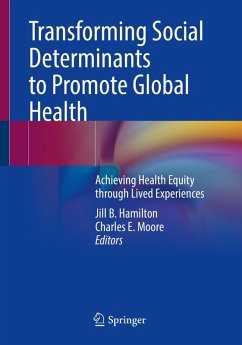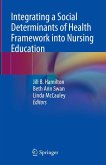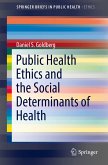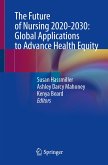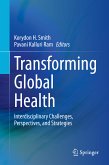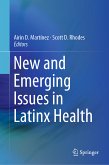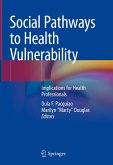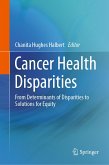Transforming Social Determinants to Promote Global Health (eBook, PDF)
Achieving Health Equity through Lived Experiences
Redaktion: Hamilton, Jill B.; Moore, Charles E.


Alle Infos zum eBook verschenken

Transforming Social Determinants to Promote Global Health (eBook, PDF)
Achieving Health Equity through Lived Experiences
Redaktion: Hamilton, Jill B.; Moore, Charles E.
- Format: PDF
- Merkliste
- Auf die Merkliste
- Bewerten Bewerten
- Teilen
- Produkt teilen
- Produkterinnerung
- Produkterinnerung

Hier können Sie sich einloggen

Bitte loggen Sie sich zunächst in Ihr Kundenkonto ein oder registrieren Sie sich bei bücher.de, um das eBook-Abo tolino select nutzen zu können.
This unique book addresses the need for the scholarly works that include the voices of clinicians, community stakeholders, and leaders of faith-based institutions in various phases of developing, implementing, and evaluating programs that address health inequities and health disparities among marginalized, middle and low resource communities. Another feature of this book is the contributions to the evidence on SDOH from not only academic researchers but clinicians, community partners, and leaders of faith-based institutions. The overall purpose of this book is really to highlight global…mehr
- Geräte: PC
- ohne Kopierschutz
- eBook Hilfe
- Größe: 19.24MB
![Integrating a Social Determinants of Health Framework into Nursing Education (eBook, PDF) Integrating a Social Determinants of Health Framework into Nursing Education (eBook, PDF)]() Integrating a Social Determinants of Health Framework into Nursing Education (eBook, PDF)48,95 €
Integrating a Social Determinants of Health Framework into Nursing Education (eBook, PDF)48,95 €![Public Health Ethics and the Social Determinants of Health (eBook, PDF) Public Health Ethics and the Social Determinants of Health (eBook, PDF)]() Daniel S. GoldbergPublic Health Ethics and the Social Determinants of Health (eBook, PDF)40,95 €
Daniel S. GoldbergPublic Health Ethics and the Social Determinants of Health (eBook, PDF)40,95 €![The Future of Nursing 2020-2030: Global Applications to Advance Health Equity (eBook, PDF) The Future of Nursing 2020-2030: Global Applications to Advance Health Equity (eBook, PDF)]() The Future of Nursing 2020-2030: Global Applications to Advance Health Equity (eBook, PDF)57,95 €
The Future of Nursing 2020-2030: Global Applications to Advance Health Equity (eBook, PDF)57,95 €![Transforming Global Health (eBook, PDF) Transforming Global Health (eBook, PDF)]() Transforming Global Health (eBook, PDF)40,95 €
Transforming Global Health (eBook, PDF)40,95 €![New and Emerging Issues in Latinx Health (eBook, PDF) New and Emerging Issues in Latinx Health (eBook, PDF)]() New and Emerging Issues in Latinx Health (eBook, PDF)73,95 €
New and Emerging Issues in Latinx Health (eBook, PDF)73,95 €![Social Pathways to Health Vulnerability (eBook, PDF) Social Pathways to Health Vulnerability (eBook, PDF)]() Social Pathways to Health Vulnerability (eBook, PDF)46,95 €
Social Pathways to Health Vulnerability (eBook, PDF)46,95 €![Cancer Health Disparities (eBook, PDF) Cancer Health Disparities (eBook, PDF)]() Cancer Health Disparities (eBook, PDF)121,95 €
Cancer Health Disparities (eBook, PDF)121,95 €- -22%11
-
-
This book contributes to a diverse perspective of the possibilities of incorporating SDOH into communities and faith-based institutions. The long-range objectives are to inform, inspire, and encourage the novice and senior faculty, clinician, community stakeholder, and faith-based institutional leader to develop, implement, and evaluate SDOH on health and health disparities among the communities they serve.
The intended audience of this book is faculty of nursing, public health, and medicine in academic and practice settings; professional leaders of nursing, public health, and medicine; community stakeholders, and leaders of faith-based institutions engaged in partnerships with health care providers. This text might also be useful to faculty of foreign studies, and behavioral sciences.
Dieser Download kann aus rechtlichen Gründen nur mit Rechnungsadresse in A, B, BG, CY, CZ, D, DK, EW, E, FIN, F, GR, HR, H, IRL, I, LT, L, LR, M, NL, PL, P, R, S, SLO, SK ausgeliefert werden.
- Produktdetails
- Verlag: Springer International Publishing
- Seitenzahl: 454
- Erscheinungstermin: 4. November 2024
- Englisch
- ISBN-13: 9783031611605
- Artikelnr.: 72068243
- Verlag: Springer International Publishing
- Seitenzahl: 454
- Erscheinungstermin: 4. November 2024
- Englisch
- ISBN-13: 9783031611605
- Artikelnr.: 72068243
- Herstellerkennzeichnung Die Herstellerinformationen sind derzeit nicht verfügbar.
